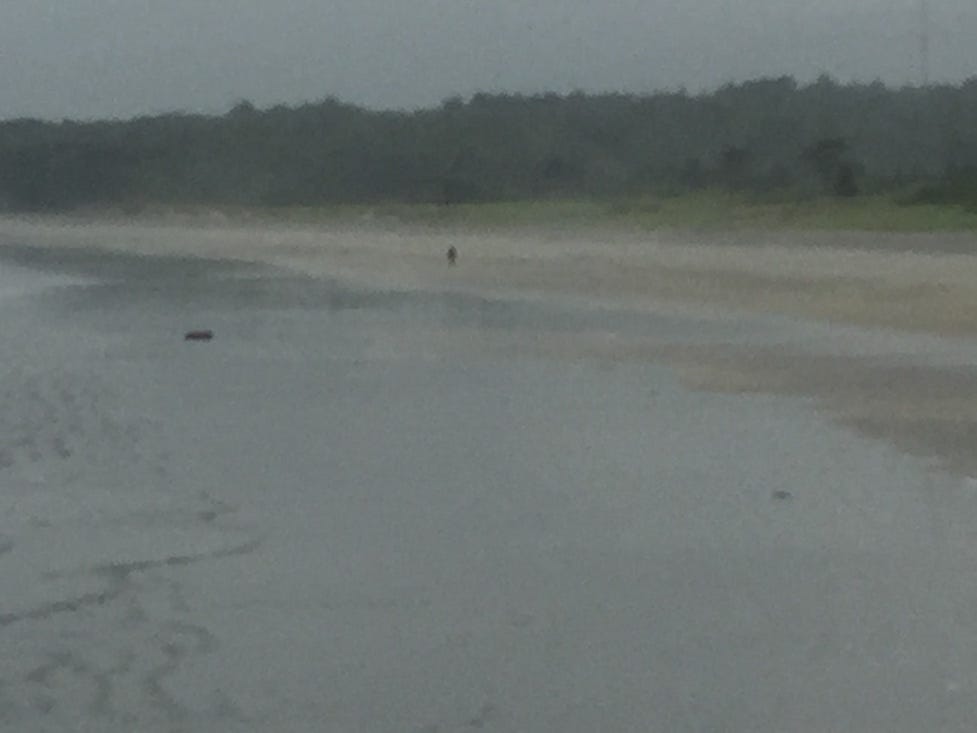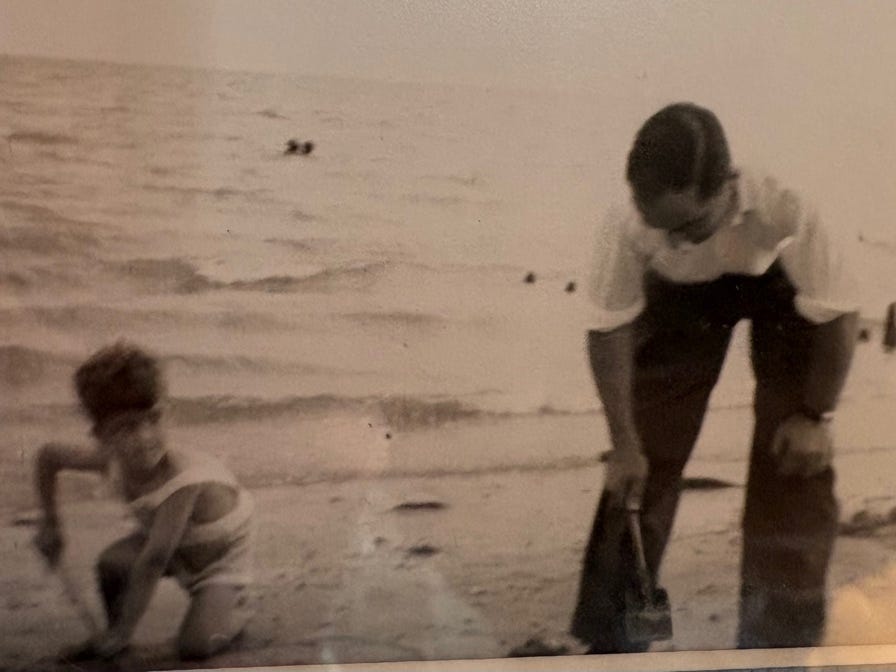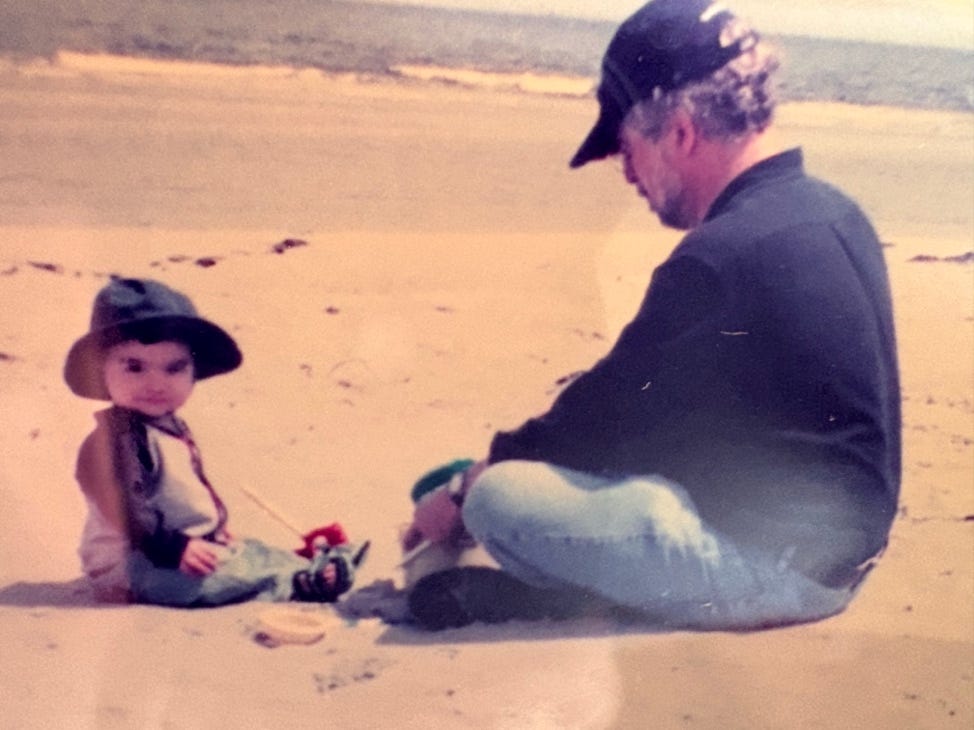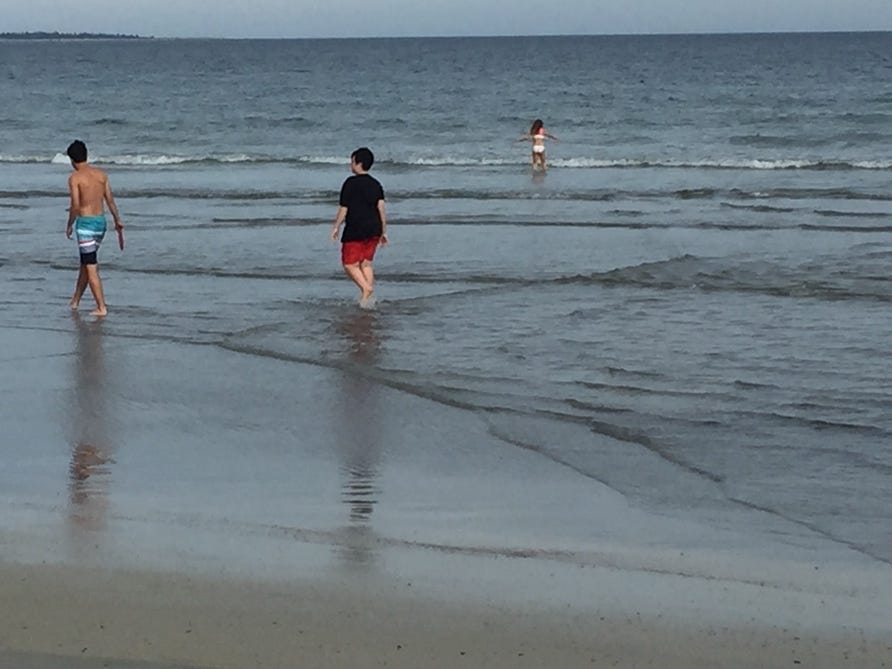The Endgame
Newsletter #117 - The beach
Toronto, September 7, 2025
The beach
It’s pretty much the end of the summer. I’m back from the beach. I’ll see sand again, more than likely. Perhaps that won’t be until next summer, although the beach can be a wonderful place in the winter, when you might be walking the foggy strand by yourself and suddenly a stranger looms up in the gloaming and greets you before disappearing back into the gloom.
In the summer, on the beach, the sun is shining, the kites are flying, and the sounds are of children laughing and dogs barking. Men in shorts stand at the water’s edge staring placidly at the surf. Young couples lie on beach towels popping open cans of beer and flirting.
Here’s a picture, taken more than 75 years ago, shortly after the end of World War II, of my father helping me build sandcastles. Notice two heads bobbing in the surf. Who were those people, I wonder, and what happened to them?
Another photograph taken about 50 years later shows me and my grandson on a beach in Nova Scotia doing much the same thing as my dad and I had done so many years before.
I’m not sure where the first photograph, the one of me and my father, was taken, but it might have been in Knokke-Le Zoute, a glamorous Belgium seaside resort where my family went once or twice in post-war summers for a week or two. I remember an apartment building there, with a balcony overlooking the beach. At night we stored our buckets and shovels on this balcony, ready for the next morning of digging.
There was some mysterious reason why we went to Knokke-Le Zoute, something to do with the business that my father was in at the time. In his ribald song “Knokke-le-Zoute Tango,” Jacques Brel wrote of the town, “Les dames en vison, les messieurs en smoking…Et moi je regarde, je ris et je bois…” (“Ladies in mink, gentlemen in tuxedos…And I watch, I laugh, and I drink…”) Maybe that was why we were there.
Perhaps the photograph of me and my father was taken, not at Knokke-Le-Zoute, but at Rustington, on the west Sussex coast of England. In the 1950s we went to Rustington several times for a summer holiday. A half-century before, J.M. Barrie used to visit the town and play elaborate games on the beach with the five sons of his friends Arthur and Sylvia Llewellyn Davies. Playing with these children inspired Barrie to write Peter Pan.
Peter Pan tells of the Lost Boys who lived in Neverland. “They were boys who were lost, and so they lived as boys would live who had no one to care for them—merrily, but always a little wistfully.” What happened to them? “They gave up being Lost Boys. They found mothers, they found jobs, and soon enough they found wives and children.” Although I have given most of my books away, I will always keep my copy of The Story of Peter Pan. It is inscribed: “To my Dear Philip to remind him of his first Pantomime Love from Mummy January 10 1950.” Much later I found jobs, wives and children.
The beach, like a forest or a river, has its own soul and way of being. Tidal pools harbour sea creatures (my father once found a conger eel in a tidal pool at Rustington, a discovery reported in the local newspaper). Shore birds live their lives on the sea’s edge—willets, gulls, plovers, whimbrels...
The tide is always on the move, relentless and powerful. “Listen! you hear the grating roar/ Of pebbles which the waves draw back, and fling,/ At their return, up the high strand,/ Begin, and cease, and then again begin,/ With tremulous cadence slow, and bring/ The eternal note of sadness in.” (Matthew Arnold, “Dover Beach”)
*****
Some reader comments on Endgame #116 (“Walking man eats fish”) published on August 17. This newsletter was about the life expectancy of those who follow various occupations.
From Michael Mendelson: “In 1858 the Legislature of Massachusetts had some tables prepared to show the mean average of 1ife attained by individuals engaged in various employments, and from which we cull the following interesting facts. Bank officers are the longest lived, their average being 68 to 76; next judges and justices, 65; and then agriculturists whose average is from 63 to 93. Clergymen, coopers, gentlemen, public officers and shipwrights average from and between 55 and 60. Blacksmiths, butchers, calico printers, lawyers, hatters, merchants, physicians, and ropemakers attain ages varying from 50 to 55. Carpenters, masons and traders live from 45 to 50. Bankers, editors, jewelers, manufacturers, mechanics, painters, shoemakers and tailors average from 40 to 45. Machinists, musicians, and printers live from 35 to 40, and clerks, operatives and teachers are the shortest lived of all being only from 30 to 35. Of course, it is not necessary that a person who follows any of the above businesses should die at a definite age, but still the table gives a very good test as to the effect of employment in wearing out the human frame.”
John Gregory writes: “I am reminded of an entertaining book—though I can find at short notice only descriptions of the movie—Who is Killing the Great Chefs of Europe? My recollection is that there were some recipes...”
From Linda Fairchild: “My Auntie Carla is 103. Studied at Julliard and returned to Newfoundland in her forties to teach harp and piano. She retired at 99.”
David Wolinsky gives us some personal information: “Considering the mortality rate of the occupations detailed in your column, I consider it amazing that I am still this side of the turf inasmuch as I have directly or indirectly been actively involved in all of them. Other than a brief initial stint in the military which considering my lack of talent should have been the end of my working career, I proceeded to become a lawyer, specializing in entertainment law, mostly music for much of my career. I also created and owned a slew of restaurants working with a plethora of chefs, and ultimately, at this late stage became a writer. And yet I’m still here.”
Earl Cherniak comments: “Not all lawyers die young... I will be 90 in 6 weeks, and I am still practicing and even occasionally litigating. Never cared about being liked. Being respected and retained was good enough.”
And finally, Bob Rae responds to my use of the Yiddish word “eytsegiber”: “I once heard someone described as a “sexual intellectual.” When I asked,“what’s that?” I was told it means “a fucking know-it-all.”
*****
And a few reactions to my new book, All Remaining Passengers
Joel writes: “Great collection of essays, many of which create insight, jog the memory, and stimulate the mind. I'm almost finished (I read just around two per night to soak up each essay better). And this collection will be reread.”
From Anne Mowat: “A wry and wonderful perspective on growing old; and I like the honesty… There is too much sugar-coating the reality of growing older. I wish I had found this book 25 years ago.”
Michael Ondaatje writes: “Perfect small essays... A delight.”
And the last word goes to Peter Ferguson, architect and author: “I almost know what you’re going to write before you do it.”
(All Remaining Passengers is available from Amazon in most countries, and from some independent bookstores in Canada (coast-to-coast) including Ben McNally Books and Book City (Yonge & St. Clair branch) in Toronto, Munro’s Books in Victoria, B.C., Russell Books in Victoria, and Salt-Water Ballad Books in Port Medway, Nova Scotia.)






Phillip, I thoroughly enjoyed your essay about the beach/beaches. You sparked my nostalgia for the beach of my childhood, Winnipeg Beach on Lake Winnipeg in Manitoba. The cottage we stayed in was the very one described by Michael.
My memory of that time and the wagon full of beach accessories is that my cousin Gwenny and I, who were older, took the then little boys to the beach in the morning and we all played, swam freely of adults, except for the odd other mothers who would scold if we overstepped our freedom. Our mothers came down at lunchtime and, after eating our sandwiches and cookies, we had to wait a full half hour before we could go back into the water. Those were the longest half hours in my life. The carefreeness of that time is especially nostalgic given the world as it is today.
Over the last five or so years, I've been designing the exhibits for a small regional museum in St-Georges, MB, which sits on the edge of the Winnipeg River, which empties into Traverse Bay on Lake Winnipeg. We've desined one exhibit that focuses on the trains that came up from Winnipeg to Grand Beach on one shore and Winnipeg Beach on a shore further west. We would pull that same wagon to the train station to meet the Saturday morning trains. All of the fathers would arrive for their weekends with their families. Those were the days!!
Made me weep with this one, buddy. The 'Dover Beach' passage to end...